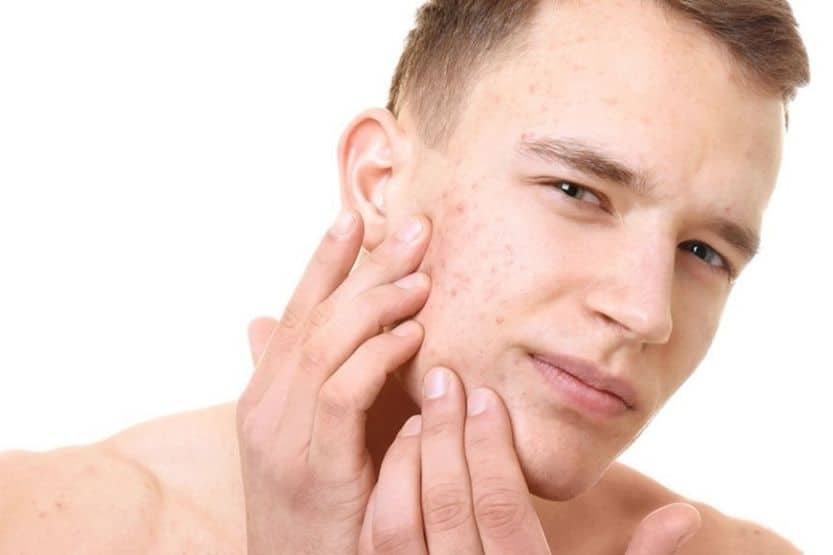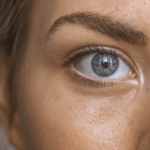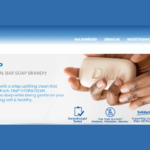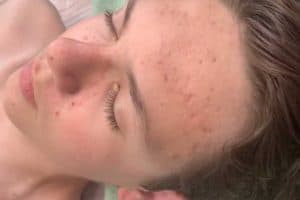Creatine is one of the most effective supplements for muscle building. However, a common concern for many is whether creatine causes acne or not. Does creatine cause acne?
There is no empirical data that directly connects creatine use and acne. Likewise, no evidence has proven that creatine worsens acne.
There have been studies that show supplemental creatine increases the body’s production of the hormone dihydrotestosterone (DHT).
DHT is indirectly associated with acne, as the hormonal imbalance of this hormone may result in acne breakouts for certain individuals. However, there is no extensive research to prove the direct connection between creatine monohydrate and acne.
Read on to learn more about creatine, its benefits and side effects, and other valuable tips on using the product.
Does Creatine Cause Acne?

There is no evidence directly showing that creatine causes acne. Also, there is no intensive research that could prove creatine worsens acne.
There have been many studies that show the health benefits of creatine supplements, as well their effectiveness in building muscle; however, there have not been any studies showing how it causes or worsens acne.
Creatine is a natural amino acid present in your brain and body’s muscles. So, your body can produce creatine on its own. The body gets creatine from red meat and seafood. Afterward, the liver, kidneys, and pancreas metabolize it.
As to creatine’s effect on acne, there are still no studies explicitly conducted about this topic. However, there have been studies that show supplemental creatine increases the body’s production of the hormone dihydrotestosterone (DHT).
DHT is indirectly associated with acne, as the hormonal imbalance of this hormone may result in acne breakouts in susceptible individuals. There is no extensive research to prove the direct connection between creatine monohydrate and acne, though.
Research About Supplemental Use of Creatine
In research conducted by a group of doctors led by Dr. Jessica Butts, they found out that “Short-term use of creatine is considered safe and without adverse effects.” However, they have not studied the safety of creatine use for adolescents and children. [1]
Hence, you can use creatine as a supplement to increase your physical performance for a short period. Nevertheless, it’s still unknown if this performance can apply to the ‘field of play.’
According to another group of researchers, creatine monohydrate can also improve older adults’ muscle health when used in conjunction with exercises. [2]
Several research pieces have established supplemental creatine’s safety during short-term use with adults for muscle strengthening, but not with adolescents and children. Hence, experts generally agree that 5 grams per day of creatine monohydrate are harmless to healthy adults. [3]
The consensus is that creatine is safe to use for normal adults and that creatine has no harmful effects if used appropriately.
Nevertheless, there are still no extensive scientific findings that could undoubtedly prove supplemental creatine’s benefits when taken more than 5 grams per day.
How Does the Body Metabolize Creatine?
To understand more about creatine, the section below will discuss how the body metabolizes creatine. Your body needs creatine to generate energy that you can use in your physical activities.
Creatine’s metabolism results in phosphocreatine and Adenosine Diphosphate (ADP), with the enzyme Creatine Phosphokinase (CPK). ADP is then converted to Adenosine Triphosphate (ATP), releasing energy.
The process also produces creatinine, a waste product eliminated through the kidneys and the liver.
The pivotal role of creatine in energy production prompted enterprising manufacturers to produce supplemental creatine to enhance bodily function.
Thus, creatine is a dietary supplement that could help build muscular strength and control. The most common type of dietary creatine supplement is creatine monohydrate.
Possible Benefits of Creatine
1. Strengthens and Builds Muscles
Studies conducted in this aspect proved sufficiently that creatine supplements could strengthen and build the muscles of adults. Sprinters experience a boost in their muscle strength during short, intense runs or high-intensity exercises.
Besides, athletes have shown some improvement in their performance. Nonetheless, creatine has minimal effect during low-intensity exercises.
Studies showed that older adults with concurrent resistance training and creatine supplement intake improved their performance in daily living activities. Creatine also reduces fatigue and increases muscle strength.
2. May Prevent Skin Aging
Initial research on this topic suggests that creatine and folic acid in facial creams may reduce wrinkles and sun damage. They still have to conduct more extensive and intensive research to state this categorically.
But it is safe to conclude that since creatine builds muscles, the facial muscles would also follow suit.
3. Improves Brain Function
A study published in the Journal of Biological Sciences in 2003 also found out that with creatine supplements, people with low levels of creatine in their brain can improve the brain’s cognitive process, memory, and function.
It seems to reduce also mental fatigue, as per anecdotal reports from creatine users.
4. Lower Blood Sugar and Cholesterol
Some research indicated that creatine might lower the blood sugar and cholesterol levels of some individuals. Examples are people suffering from hyperglycemia (high blood sugar) in type 2 diabetes patients and hypercholesterolemia (high blood cholesterol.)
Elevated sugar levels (glucose) and cholesterol in the blood could result in life-threatening conditions such as diabetes and atherosclerosis.
5. May Slow Down Vision Loss and Eye Damage
Some studies showed that creatine seems to slow down eye damage and vision loss based on their preliminary data. An in-depth study is recommended to establish a proven connection between creatine and the reduction of vision loss.
6. Improves Clinical Markers in Neurodegenerative Conditions
Some studies indicated that creatine could improve Parkinson’s disease, muscular dystrophy, amyotrophic lateral sclerosis (ALS), and Huntington’s disease. These conditions are all related to muscular function.
7. Reduces Bone Loss
There is an indication that creatine may help reduce bone loss, aside from strengthening your muscles. This occurrence is most helpful with older adults who need that extra boost to function correctly in their muscular system.

8. Useful for People Low in Creatine Levels
If you’re not eating sufficient creatine, you can take supplemental creatine to normalize its level in your muscles. Take note that ample creatine is needed for you to be able to produce energy.
Possible Side Effects of Creatine
Even though creatine used in proper amounts and within a short period on adults has no proven serious side effects, experts have still to conduct an extensive study on the safety of its long term use.
Furthermore, people with underlying conditions, such as organ impairment, should not take in creatine.
Here are some reported side effects of creatine when not taken properly:
1. May Decrease Sexual Function
There are a few reports of decreased sexual function, but no valid data could establish the reports’ integrity. Consequently, if you evaluate creatine’s physiologic action as a muscle-strengthening substance and a DHT-increasing substance – your sexual function should increase instead.
Some studies stated that creatine does not affect sexual function, but they have to study this aspect more extensively to establish valid data.
2. Prolonged Use May Affect Emotional Stability
The use of high doses of creatine for extended periods may adversely affect emotional stability. Creatine may increase depression in susceptible individuals because of the hormonal imbalance it may create. For as long as creatine is taken correctly, this condition will not occur.
3. May Weaken Immune System
In one study, there was an indication that creatine supplements and creatine may affect immune cells’ ability to detect bacterial and viral pathogens.
This occurs because the primary splenocytes (white blood cells in the spleen) were affected in the study. This is because the spleen is one of the major organs involved in the body’s immune system.
The results were not directly connected to creatine intake, though.
4. Other Side Effects, Usually Occur with Excess Creatine Intake
- Bloating
- Muscle cramping
- Dizziness
- Nausea
- Water retention
- Dehydration
- Gastrointestinal pains
- Weight gain
- Dizziness
Again, does creatine give you acne? Researchers were not able to establish a direct connection between creatine use and acne. More so, there is no sufficient evidence that could prove creatine worsens acne.
In fact, some studies conducted about creatine established that the supplement is effective in strengthening and building muscles.
Next, let’s discuss some tips on the safe use of creatine.
Tips for Safely Using Creatine
1. Only Take the Normal Dose of Creatine
Your muscles will not increase in performance even if you go beyond the normal intake. Once your muscles become saturated with creatine, they would no longer take in extra creatine.
Taking more than your body can tolerate can cause an accumulation of creatine in your body, disrupting the state of balance in your system that would cause health problems.
You can take 20 grams daily for 5 to 7 days for quick action. Afterward, reduce your intake to 2 to 10 grams daily for two weeks.
Your creatine intake will depend on your weight and activities as well. Thus, you have to consult a health specialist to determine the correct amount of creatine you should take.
2. You Can Take Creatine Right Before and After Exercise
Experts recommend that you take creatine right before and right after you exercise. You could also divide your daily dose and take it in the morning and the evening.
Taking more than you should take might exacerbate the side effects in sensitive individuals. Creatine intake is encouraged in high-intensity exercises but does not do anything for low-intensity activities.
3. You Can Get Natural Creatine from Food
If you’re not an athlete, you don’t need supplemental creatine for your muscles to stay healthy. You can quickly obtain your natural creatine from fish and red meat. Eating a balanced diet will allow you to produce the creatine within your body sufficiently.
4. Avoid Alcohol While Taking Creatine
Alcohol can reduce creatine’s benefits as it does the opposite to the muscles; it weakens and renders them lethargic. Alcohol also prevents the absorption of essential nutrients in the small intestines, depriving the body of vital substances needed for metabolic functions.
5. People Younger than 18 Should Not Take Creatine
Since young people are still developing their organs and immune system, this may cause muscle dysfunction and dehydration. However, there are reports that children can take creatine in smaller doses and shorter periods for therapy.
The American College of Sports Medicine and the American Academy of Pediatrics has agreed that teenagers should not use creatine and other performance-enhancing supplements. Nevertheless, researchers have to conduct a more in-depth study regarding this claim.
6. People with Kidney, Liver, and Heart Impairment Should Not Take Creatine
People with arrhythmias or heart palpitations, liver and kidney dysfunction should not take creatine. Scientists are still researching creatine, and it’s best to play safely while the effects on individuals with these conditions are still unsure.
One reason for this precaution is that the organs are responsible for eliminating creatine. If they are impaired, they would not be able to eliminate excess creatine from the system. The increased concentration of creatine in the body could cause health problems.
7. Consult Your Doctor Before Taking Creatine Supplements
You have to consult your doctor before taking any creatine supplement. It may not be suitable for your health. Take only creatine when you are healthy and above 18 years old, unless your doctor recommends it.

8. Observe Adequate Facial Care
Acne can occur due to various factors, such as continuously clogged pores, stress, hormonal imbalance, wrong diet, excess oil, some medications, and bacteria. One or two of these factors can cause an acne breakout in susceptible individuals.
Can creatine cause acne? Studies conducted do not correlate the use of creatine with acne. On the other hand, studies have shown that it can give several health benefits, such as aiding in building muscles.
Conclusion – Creatine Acne
There is no established direct relationship between creatine use and acne. Also, no evidence could prove creatine causes acne or worsens it. On the contrary, some studies conducted indicated that creatine is effective in building and strengthening muscles.
There have been studies that show supplemental creatine increases the body’s production of the hormone Dihydrotestosterone (DHT).
DHT is indirectly associated with acne, as the hormonal imbalance of this hormone may result in acne breakouts for certain individuals. However, there is no extensive research to prove the direct connection between creatine monohydrate and acne.
Acne occurs because of a combination of several factors. Thus, the essential step that you must do to prevent acne is to keep your face clean at all times, to observe healthy practices, and to eat a balanced diet.
Until scientists conduct further studies on creatine and acne, you will have to consider creatine as a supplement that does not cause acne.







